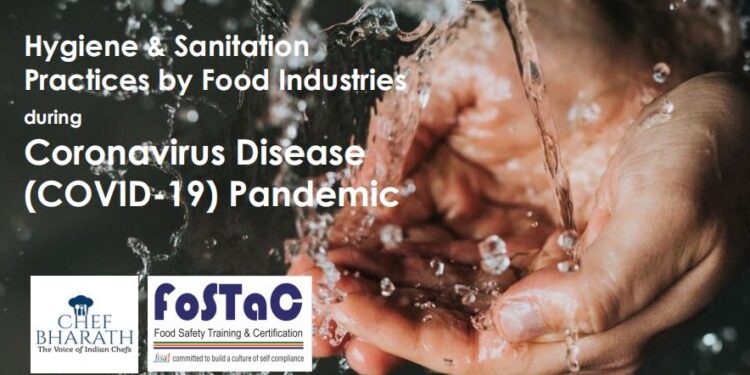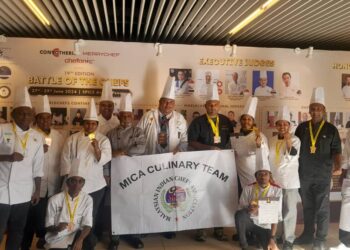–Chinmayee Deulgaonkar
 The spread of SARS-CoV-2 Coronavirus, the disruptive pandemic causing virus can be controlled by simple, yet highly
The spread of SARS-CoV-2 Coronavirus, the disruptive pandemic causing virus can be controlled by simple, yet highly
effective practices if followed in a robust and rigorous manner.
Food Safety and Standards Authority of India (FSSAI) has released the guidance document “Food Hygiene and Safety Guidelines for Food Businesses (FBO) during Coronavirus disease (Covid-19) Pandemic”. This code of practice is in addition to Schedule IV requirements for GMP, GHP practices. Also, it is expected that ‘ Aarogya setu’ app is downloaded and used.
Coronavirus is transferred through droplets during coughing from a Covid-19 positive person. When these droplets fall on the surface and these surfaces are further touched by hands (and then further touched to mouth, eyes) the spread happens. The virus survival period is dependent on the surface it falls. Example: On Cardboard, it is 24 hrs, whereas on plastic it last for 24-48 hrs and on wood, it is nearly 5 days.
FSSAI has recommended the following to be followed at all times by FBO.
1. Personnel Monitoring: All personnel entering in the facility including visitors to be monitored at the entry, during the work, and exit for the Covid-19 symptoms. This includes
– Thermal Screening (the body temp. must be below 99 0 F)
– Cough (especially dry),
– Breathing difficulties/shortness of breath
– Fatigue
– Muscle pain
Keeping the relevant monitoring data is essential to demonstrate compliance.
2. Social / Physical distancing of 1 meter (appx. 3 ft): This is required while performing any operations or activities including home delivery. The recommendation is 3-4 persons in area of 10 sq. ft. FBO can work reversely by adjusting shifts or production lines, reducing the labour, or restricting the number of customers in the retail to follow this requirement.
3. Personal Hygiene: Maintaining high standard of personal hygiene is critical for the FBO. This includes
a) Good Respiratory Hygiene: Mask/face cover prevents the spread of droplets during the cough. The choice of the mask can be dependent on the area hygiene standards and the risk of the product. The mask needs to be replaced after a maximum 6 hours of use. The disposal of the mask (and other PPE) is to be done like medical waste, in dedicated waste bins. If the mask was worn by the suspect or the person in the clinical activities, it needs to be decontaminated before trash. These masks can be put in a separate bag before throwing in the waste bins.
b) Hand Washing: This includes hand wash with water and soap for a min of 20 sec (as per WHO guidelines). The sanitation practices with 70% alcohol-based sanitizers or equivalent to be followed. This is also required for a customer to sanitize his hands at the entry and exit of food retail premises. Remember that cleaning is not substituted by sanitation and sanitation is not substituted by wearing gloves.
c) Illness Reporting: Encourage your team to report the symptoms or other illnesses. Measures like to stay at home, quarantine, isolation needs to be taken based on symptoms shown by suspects. There is a stigma attached to the disease. Be Empathetic as there will be concerns for salary, job security. Give a message that “Covid-19” is a curable disease.
4. Cleaning and Sanitation: Cleaning-Sanitation and/or Disinfection-Drying are the activities that will prevent the spread of the coronavirus. Although FSSAI has given examples of high touchpoints, it is essential that the FBO does its own risk identification of identifying “High touchpoints” and decide the measures. Toilet, Washrooms are considered as high-risk areas. The steps are further elaborated as follows. a. Cleaning: All the areas of food establishment will have deep cleaning with soap and water. It must be remembered that in the presence of dirt and soil, the effectiveness of sanitizers and disinfectants decreases significantly. Hot water (60 0 C) is recommended to be used for cleaning of equipment, utensils, cutlery, etc
b. Sanitation / Disinfection: While both sanitizers and disinfectants kill the “germs”, disinfectants are more powerful than the former. It kills the microbes to the negative log of 5 while sanitizers kill to the negative log of 4. The contact time required by disinfectant ranges from 10 – 60 min depending upon the active ingredient it has. FSSAI has recommended the use of hypochlorite solutions from 0.1% (1000 ppm) to 1% (10,000 ppm) or quaternary ammonium compound depending upon the area. Note that this concentration is for surface disinfection and should not be confused with the food. There are other families of disinfectants that are approved by the US Environmental Protection Agency (EPA) to be effective against human coronavirus. E..g: Hydrogen Peroxide, Peroxyacetic acid, etc. FSSAI also gives guidance on use of 70% alcohol sanitizers to be used for metallic surfaces. The use of e-wallets is highly preferred.
c. Drying: Preferably air drying.
5. Emergency Procedures: FBO is expected to form an Emergency team with an Emergency Coordinator. The procedure will have names for the nearest authorized testing & treatment hospitals, contact details of the disinfection agency. It is expected that certain stock of disinfectant & PPE will always be available for emergency situations.
6 Procedures for Suspects and positive detected persons: The guidelines additionally cover the steps to be taken if a person is identified as a suspect. The information to the authorities on the full measures taken and the protocol followed is essential for the FBO. Covid-19 recovered person can come back to the work when there are no symptoms of fever (without medicine for 72 hrs) and COVID-19 test is negative for at least 2 times.
It must be noted that the guidelines/code of practices are based on the current situation and will be revised based on further information/notification that will come from time to time from various government authorities.
FOSTAC program on Hygiene and Sanitation practices by FBO amid Covid-19 is available and being delivered by approved Training Partners. It is expected that the FBO and their suppliers have undergone the course. Taking preventive measures to the utmost is the need of the hour. Let’s get comfortable with uncomfortable till the new uncomfortable becomes comfortable.
(The author is the Managing Director, FOODCHAIN ID India, and Hon. Secretary of AFSTI-Mumbai Chapter. The coloumn is the transcript of her speech in a webinar jointly organized by ChefBharath.com and FSSAI)







